

Faster pace of climate change is 'scary', former chief scientist says. Media playback is unsupported on your device Extreme events linked to climate change, such as the heatwave in Europe this year, are occurring sooner than expected, an ex-chief scientist says.
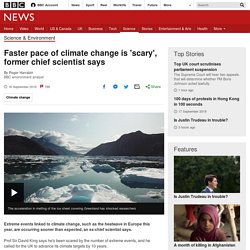
Prof Sir David King says he's been scared by the number of extreme events, and he called for the UK to advance its climate targets by 10 years. But the UN's weather chief said using words like “scared” could make young people depressed and anxious. Campaigners argue that people won't act unless they feel fearful. Speaking to the BBC, Prof King, a former chief scientific adviser to the government, said: “It’s appropriate to be scared. Huge Antarctic iceberg poised to break away [06/01/17] Image copyright Adrian Luckman An iceberg expected to be one of the 10 largest ever recorded is ready to break away from Antarctica, scientists say.
![Huge Antarctic iceberg poised to break away [06/01/17]](http://cdn.pearltrees.com/s/pic/th/antarctic-iceberg-poised-break-145162293)
A long-running rift in the Larsen C ice shelf grew suddenly in December and now just 20km of ice is keeping the 5,000 sq km piece from floating away. Iceberg twice the size of New York City is set to break away from Antarctica. An iceberg roughly twice the size of New York City is set to break away from an Antarctic ice shelf as a result of a rapidly spreading rift that is being monitored by Nasa.
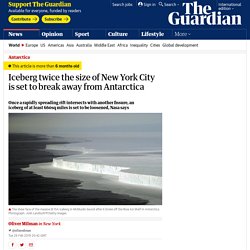
A crack along part of the Brunt ice shelf in Antarctica first appeared in October 2016, according to the National Aeronautics and Space Administration (Nasa). The crack is spreading to the east. This rift, known as the Halloween crack, is set to intersect with another fissure that was apparently stable for the past 35 years but is now accelerating north at a rate of around 2.5 miles a year. Climate change: Fresh doubt over global warming 'pause' Sea level fears as Greenland darkens. Image copyright Kate Stephens Scientists are "very worried" that the melting of the Greenland ice sheet could accelerate and raise sea levels more than expected.
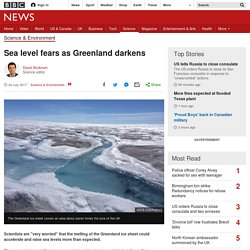
They say warmer conditions are encouraging algae to grow and darken the surface. Dark ice absorbs more solar radiation than clean white ice so warms up and melts more rapidly. Hurricane Harvey: The link to climate change. Image copyright Getty Images When it comes to the causes of Hurricane Harvey, climate change is not a smoking gun.
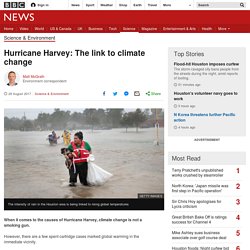
However, there are a few spent cartridge cases marked global warming in the immediate vicinity. Hurricanes are complex, naturally occurring beasts - extremely difficult to predict, with or without the backdrop of rising global temperatures. Switzerland landslide: Are the Alps melting? Image copyright Reuters A massive rockslide in Switzerland's Val Bondasca was not a complete surprise.
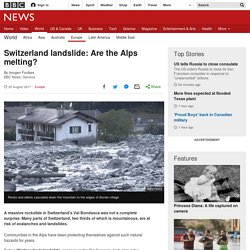
Many parts of Switzerland, two thirds of which is mountainous, are at risk of avalanches and landslides. Communities in the Alps have been protecting themselves against such natural hazards for years. Before Wednesday's landslide, sensors on the Piz Cenaglo, high above the Bondasca valley, had already shown that the rock mass was moving. Warming to boost deadly humidity levels across South Asia. Image copyright NOAH SEELAM Millions of people living in South Asia face a deadly threat from heat and humidity driven by global warming according to a new study.
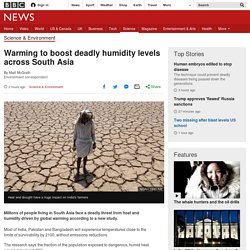
Most of India, Pakistan and Bangladesh will experience temperatures close to the limits of survivability by 2100, without emissions reductions. The research says the fraction of the population exposed to dangerous, humid heat waves may reach 30%. Second lowest minimum for Arctic ice. Image copyright PETER J.
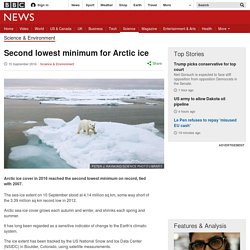
RAYMOND/SCIENCE PHOTO LIBRARY Arctic ice cover in 2016 reached the second lowest minimum on record, tied with 2007. The sea-ice extent on 10 September stood at 4.14 million sq km, some way short of the 3.39 million sq km record low in 2012. Arctic sea-ice cover grows each autumn and winter, and shrinks each spring and summer. Highest September temperature since 1949 as 32.2C recorded. Image copyright PA The UK's hottest day of the year so far - and the warmest September day since 1911 - has been recorded in Gravesend, Kent, where it reached 34.4C (93.9F).
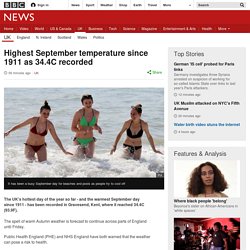
The spell of warm Autumn weather is forecast to continue across parts of England until Friday. Public Health England (PHE) and NHS England have both warned that the weather can pose a risk to health. Elsewhere, yellow warnings for rain are in place for some parts of northern England and southern Scotland. Climate Change Will Make UK Coastline More Dangerous, Expert Says. The UK's coastlines will become even more dangerous because of climate change, an expert has told Sky News.
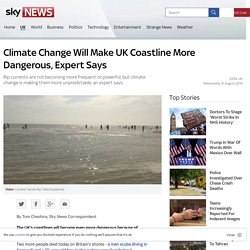
Two more people died today on Britain's shores - a man scuba diving in Cornwall and a 17-year-old boy in the waters near Sunderland. Last week, five young men were drowned at Camber Sands. The weekend before, seven people died in different parts of waters around the UK. Rip currents - fast moving, narrow channels of water that can drag swimmers out to sea - are not becoming more frequent or more vicious. But our changing climate is making them more unpredictable, according to Dr Simon Boxall, an oceanographer at the University of Southampton.
Global warming slowdown 'could last another decade' 21 August 2014Last updated at 14:45 ET By Matt McGrath Environment correspondent, BBC News. Climate change to boost summer flash floods, says study. 1 June 2014Last updated at 13:00 ET By Matt McGrath Environment correspondent, BBC News Flash flooding struck the north Cornwall village of Boscastle in the summer of 2004 Global warming will lead to a significant increase in extreme summer downpours in the UK, a study suggests. The Met Office and Newcastle University researchers say there could be five times the number of "extreme rainfall events" per hour, under extreme warming projections. This would cause "really severe" flash flooding in many parts of the UK, according to the scientists. Wavier jet stream 'may drive weather shift' 15 February 2014Last updated at 14:32 ET By Pallab Ghosh Science correspondent, BBC News, Chicago Pallab Ghosh: "We may have to get used to winters where spells of weather go on for weeks - or even months" The main system that helps determine the weather over Northern Europe and North America may be changing, research suggests.
The study shows that the so-called jet stream has increasingly taken a longer, meandering path. Floods: Environment Agency in dredging row. 27 January 2014Last updated at 11:15 ET Environment Secretary Owen Paterson: "It appears that we need to dredge these two rivers" Environment Secretary Owen Paterson has been confronted by angry residents in an area badly hit by flooding. Farmers and MPs in the Somerset Levels have accused the government and the Environment Agency of failing to take action by dredging the rivers. The agency has said increased dredging would not have prevented recent flooding. Mr Paterson promised an action plan would be drawn up to provide a long-term solution. Are ideas to cool the planet realistic?
20 September 2013Last updated at 10:05 ET By Melissa Hogenboom Science reporter, BBC News The potential risks of attempting to control the Earth's climate are not yet fully understood The deliberate large-scale manipulation of the Earth's environment, called geoengineering, could be one way to cool the Earth or help reduce levels of carbon dioxide in the atmosphere.
Five-fold rise seen in UK landslides. 12 September 2013Last updated at 09:19 ET By Simon Redfern Reporter, BBC News, Newcastle. DNA study suggests hunting did not kill off mammoth. Climate change 'driving spread of crop pests' Alaska's disappearing ice. Why has global warming stalled? 22 July 2013Last updated at 17:15 GMT Solar energy is absorbed by the oceans. Antarctic's Pine Island glacier produces giant iceberg. 10 July 2013Last updated at 06:51 ET By Jonathan Amos Science correspondent, BBC News. Obama lays out climate action plan. 25 June 2013Last updated at 18:49 ET By Paul Rincon Science editor, BBC News website President Obama said he would use his executive powers to enforce the new rules on reduction of greenhouse gas emissions US President Barack Obama has laid out a package of measures aimed at curbing climate change, including limits on emissions from power plants. He also unveiled plans for an expansion of renewable energy projects, improved flood resilience and calls for an international climate deal.
Administration officials had earlier rejected the idea of a "carbon tax". Central Europe on alert for flooding. Climate slowdown means extreme rates of warming 'not as likely' Climate change shifts migrating birds' wintering ground. Scientists call for action to tackle CO2 levels. 11 May 2013Last updated at 03:52 ET The last time CO2 was regularly above 400ppm was three to five million years ago Scientists are calling on world leaders to take action on climate change after carbon dioxide levels in the atmosphere broke through a symbolic threshold. Daily CO2 readings at a US government agency lab on Hawaii have topped 400 parts per million for the first time.